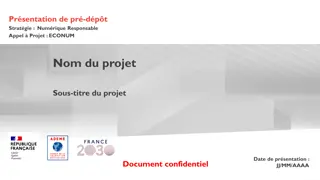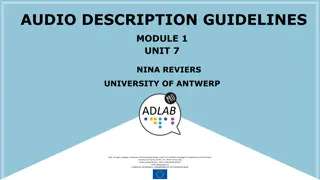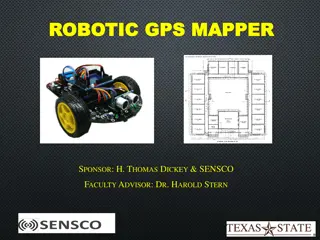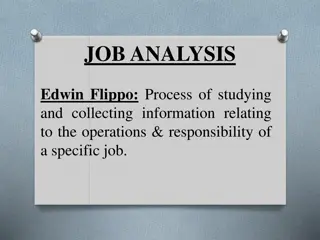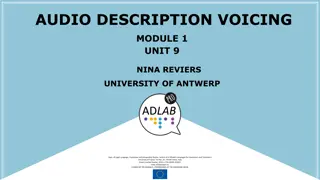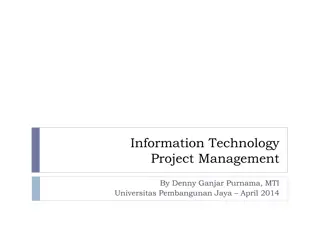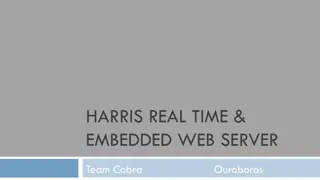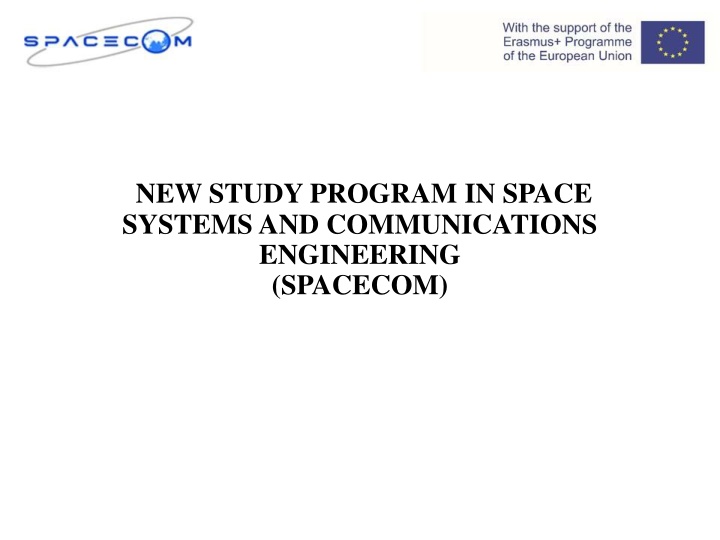
Innovative Space Systems and Communications Engineering Program Launch
Explore the new study program in Space Systems and Communications Engineering (SPACECOM) initiated by a consortium of renowned universities and organizations. This project aims to modernize master's programs in satellite technology and communication systems, aligning with Bologna process standards. Expected outcomes include the opening of a new master program, course modernization, establishment of a research laboratory, staff retraining, and development of educational resources.
Download Presentation

Please find below an Image/Link to download the presentation.
The content on the website is provided AS IS for your information and personal use only. It may not be sold, licensed, or shared on other websites without obtaining consent from the author. If you encounter any issues during the download, it is possible that the publisher has removed the file from their server.
You are allowed to download the files provided on this website for personal or commercial use, subject to the condition that they are used lawfully. All files are the property of their respective owners.
The content on the website is provided AS IS for your information and personal use only. It may not be sold, licensed, or shared on other websites without obtaining consent from the author.
E N D
Presentation Transcript
NEW STUDY PROGRAM IN SPACE SYSTEMS AND COMMUNICATIONS ENGINEERING (SPACECOM)
NEW STUDY PROGRAM IN SPACE SYSTEMS AND COMMUNICATIONS ENGINEERING (SPACECOM) PROJECT DESCRIPTION Khabibullo Nosirov, SPACECOM Project Coordinator Tashkent University of Information Technologies named after Muhammad al-Khwarizmi, Uzbekistan
Contents: 1. Consortium 2. Aims and objectives 3. Workplan 4. Description of work packages 5. Work breakdown structure 6. Project management structure 7. Contact list 8. Discussion
The Consortium: Tashkent University of Information Technologies, Technical University of Berlin, University of Sorbonna, Artesis-Plantijn University of Applied Sciences, Technical University of Sofia, EXOLAUNCH, Coursento, National University of Uzbekistan, Tashkent State Technical University, Turin Polytechnic Institute in Tashkent, Karshi branch of TUIT, Ferghana Polytechnic Institute, Branch center of retraining and professional development of pedagogical staff under TUIT, Astronomical Institute of the Uzbek Academy of Sciences.
The main objectives of the project are: Development and modernization of the existing master's program in satellite technology, space technology and communication systems, as well as the use of satellite communications in accordance with the recommendations of the Bologna process.
Expected Project Results: - opening new master program in space engineering and technology has been opened; - modernization of the existing and development of new courses related to Space and Communication Engineering; - organizing new educational-scientific research laboratory for space engineering and technology; - re-training personal of TUIT and its branches; - developing new handbook and educational-methodological manuals.
Partners P1 - Tashkent University of Information Technologies P2 - Technische Universit t Berlin P3 - Sorbonne Universite P4 - Artesis-Plantijn University of Applied Sciences P5 - Technical University Sofia P6 - EXOLAUNCH P7 - Coursento P8 - Ferghana Polytechnical Institute P9 - Tashkent State Technical University P10 - Turin Polytechnic University in Tashkent P11 - Karshi University of Information Technologies P12 - National University of Uzbekistan P13 - Astronomical Institute of the Uzbekistan Academy of Sciences P14 - Retraining In-Service Center of Academic Staff
No. Task 2019 2020 2021 2022 10 11 12 10 11 12 10 11 12 10 1 2 3 4 5 6 7 8 9 1 2 3 4 5 6 7 8 9 1 2 3 4 5 6 7 8 9 PROJECT SCHEDULE M10 M11 M12 M10 M11 M12 M10 M11 M12 M1 M2 M3 M4 M5 M6 M7 M8 M9 M1 M2 M3 M4 M5 M6 M7 M8 M9 M1 M2 M3 M4 M5 M6 M7 M8 M9 Need analysis 1.1 Learning outcomes definition 1.2 Syllabi design 2.1 Course contents design E-learning materials development, lectures recording, presentations preparation, creating Web application Prepare a set of documentation for GSLAB/SATLAB: purchase/install the equipment Retrain academic teachers/mentors in new curricula, methodology Master Classes in new curricula held in GSLAB/SATLAB; pilot operation of GSLAB/SATLAB 2.2 2.3 2.4 2.5 2.6 Pilot teaching 2.7 Quality control framework 3.1 Internal evaluation 3.2 Development and maintenance of the project Web page Maintenance of partners Web pages; project newsletters design 4.1 4.2 Dissemination materials 4.3 Information conferences/dissemination events Develop documentation/purchase/install equipment/establish networking of C-OFFICE 4.4 4.5 Planning exploitation after the project end 4.6 Exploitation agreement Staff training / pilot operation of C-OFFICE/network of C- OFFICES 4.7 4.8 Accredit curricula on institutional/national level 4.9 Daily project administration and coordination 5.1 Coordination meetings 5.2 Project reports 5.3
WP1: Preparation - To review, to analyse, to present analysis, to work out recommendations and to upgrade the existing curricula. - Development of questionnaire for the need analysis P4/P7; - Setting up a framework for curricula P1/P2/P6/P7; - Development of guidelines for learning outcomes definition P1/P2; -Analysis of job needs P6/P13; - Need analysis in UZ P1-P14; - Need analysis in the EU P2-P7;
WP2 Development (Leading P2) P1 development of the syllabus and the content of the courses Digital communications P2 development of the syllabus and the content of the courses Fundamentals of Space Technology , Satellite Technologies , Space system design , Satellite communication , Applied Project Management for Space System , Theory of Inventive Problem Solving , Electronic Design and Assembly of communictions systems P3 development of the syllabus and the content of the courses Celestial mechanics for space mission engineering, Advanced Microelectronics: design of custom integrated circuits in CMOS technologies for space applications, Programming Principles & Object Oriented programming
WP2 Development (Leading P2) cont. by P6-practice oriented workshop. Then the responsible partners will at home work out the agreed curricula/modules to be adapted in target HEIs. Based on the new curricula/modules P1, P7 - P12 supported by P1-P5 will prepare/publish teaching materials. The leader of WP1 will be P2. Concerning WEB platform P1 and P2 will discuss with P7-P14 content of WEB platform and methodology of database creation. In 12.month of the second project year the new curricula/modules will be adopted on institutional level and in 9.month of the 3 project year accredit on national level. Equipment lists/lay out for GSLAB/SATLAB are the task of P1/P2/P6. The procedure of preparing purchase of the equipment is the task of P2/P6 in collaboration with target universities: choosing the sellers, working out shipping contracts, shipping timetable etc. Mile stones: new curricula/modules; handbooks published; new GSLAB/SATLAB platform. Performance indicators: number of curricula/modules developed/adopted/accredit; number of handbooks published; new GSLAB/SATLAB equipped on schedule. In the frames of intern evaluation all partners present a Monitoring report in each activity of WP2, as the link to overall coordination. Linkages with WP3-WP5 are foreseen.
WP2 Development (Leading P2) cont. P4 development of the syllabus and the content of the courses Development of space-grade embedded systems, Educational digital tools & blended learning tools for engineering education, Data protection, P5 development of the syllabus and the content of the courses CAD tools for design of systems on chip and Microelectronics for Information and Communication technologies P6 Workshop Hot topics in satellite communication system using D-Star technology The partners will set up a Work Plan on WP2 inclusive timetable distributing the tasks of each participant to achieve the objectives. During the seminar at P1 in a special workshop on new curricula/module responsible partners will present the planned curricula/modules; the target HEIs and invited stakeholders will discuss and agree the content of curricula/modules to be developed by P1-P5 core curricula; by P2, P4 elective curricula
WP3 Quality Plan (Leading org. P6) Development of questionnaire for need analysis P2/P7 Evaluation of the need analysis report during the second project meeting, PMB Peer review of syllabi all, during the third project meeting Development of questionnaire for usability tests of the e-learning environment and courses P1/P6; Design walkthrough of e-learning environment course developers from all partner institutions; Usability test online by tutors and learners and during the fourth project meeting; Peer review of e-learning courses online, All partners; Evaluation of learning attitudes to the innovated curricula teachers and learners from all partner institutions during the pilot test and field trial; QA of project activities and results during all PMB meetings; QA report external evaluator.
WP4 DISSEMINATION & EXPLOITATION (Leading org. P7) Dissemination of related outputs /outcomes defined. Joint WEB based platform; establish C-Office with stakeholders, attraction of media awareness
WP5 Management (Leading org. P1) Local management and administration All All partners will be responsible for a workpackage or for a workgroup: Leading the workgroup on need analysis P1/P7; Leading the workgroup on course development P2; Leading the workgroup on e-learning materials - P4; Leading the workgroup on evaluation P6; Leading the workgroup on dissemination P7. WP1 leader: P4 WP2 leader: P2 WP3 leader: P6 WP4 leader: P7 WP5 leader: P1; Organisation of kick-off meeting in Tashkent P1 Sub-contracting external evaluator and auditors P1 Organisation of PMB meetings for need analysis in UZ P7 Organisation of PMB meeting for syllabi evaluation P2, P3, P5 Organisation of training seminar for teachers P1-P7 Organisation of PMB meeting for e-learning materials evaluation in Antwerp P4 Organisation of PMB meeting for the pilot test in UZ P9, P11, P13 Organisation of PMB meeting for the field trial evaluation and exploitation agreement in Sofia P5 Organisation of final PMB meeting and dissemination workshop P1, P2, P6, P9, P12, P14 Attendance of meeting of CBHE EA in Brussels P1, P2 Intermediate and final reports contact persons of all partner organisations and the project co-ordinator
Thank You! Khabibullo Nosirov, PhD Project coordinator, Head of the Department Tashkent University of Information Technologies named after Muhammad al-Khwarizmi Radio and Mobile Communications Faculty Amir Temur 108, 100084 Tashkent, Uzbekistan n.khabibullo1990@gmail.com +998 99 811 57 62 (WhatsApp) +998 90 911 57 62 (Telegram) www.tuit.uz (www.spacecom.uz)


